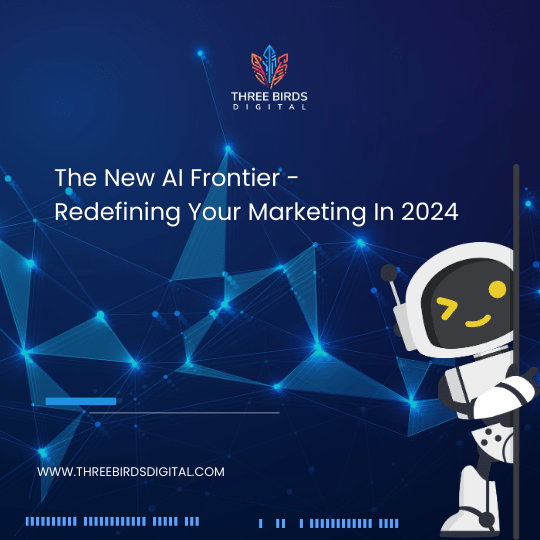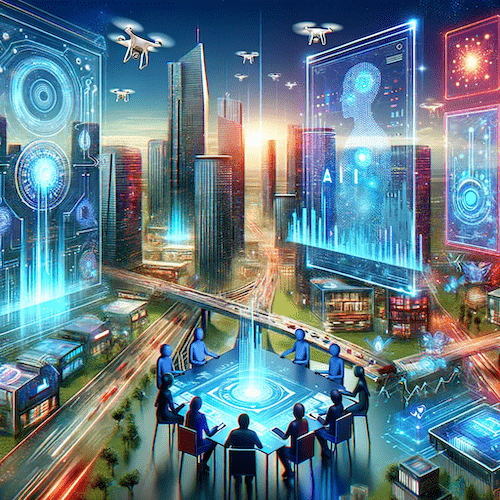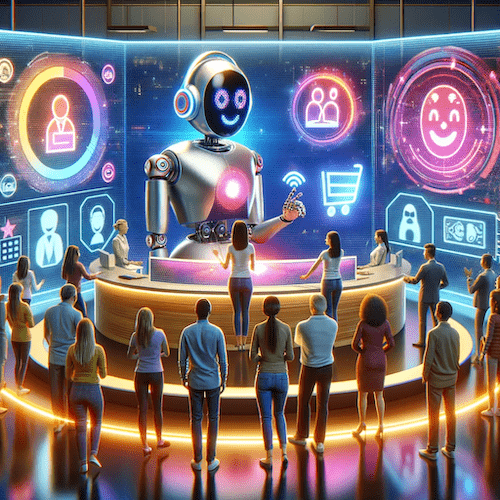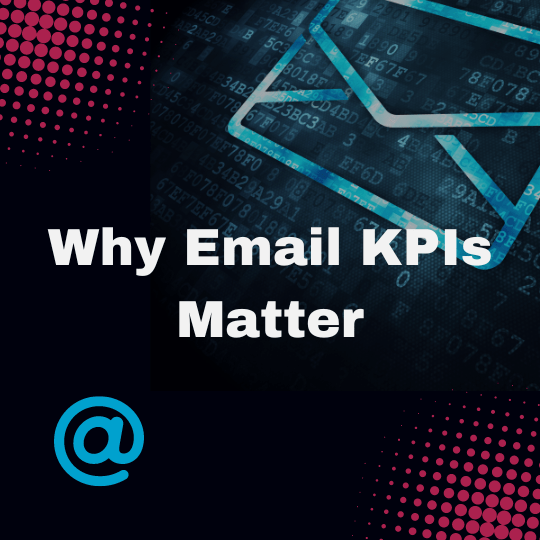
In 2024, we find ourselves at a pivotal moment in the history of digital marketing. The landscape is evolving at an unprecedented pace, primarily driven by the relentless advancements in Artificial Intelligence (AI). As we witness this remarkable era, it becomes increasingly clear that AI is not just an auxiliary tool but the very backbone of modern marketing strategies. Large and small businesses are rapidly adopting AI technologies, recognizing their potential to revolutionize how we approach marketing.
This blog delves deep into the transformative impact of AI on the marketing sector. AI’s role in marketing has grown beyond mere data analysis; it’s now vital in crafting more effective, personalized, and dynamic strategies. The ability of AI to process and interpret vast amounts of data, understand consumer behavior, and automate responses in real time has opened new frontiers in marketing. These capabilities are not just advantageous but essential in an environment where consumer preferences shift rapidly, and the pressure to remain relevant never ceases.

We’ll explore how businesses are using AI to gain a competitive edge, from utilizing sophisticated algorithms for predictive analytics to employing machine learning for unparalleled personalization. This technological revolution is reshaping the marketing world, offering insights into the latest trends, challenges, and opportunities that lie ahead. The emergence of AI-driven tools has democratized marketing capabilities, enabling businesses of all sizes to make data-driven decisions and engage with their audiences in more meaningful ways.
However, with great power comes great responsibility. Integrating AI in marketing also brings forth new ethical considerations, particularly concerning data privacy and the potential biases inherent in AI algorithms. This blog will also address these critical issues, ensuring that the adoption of AI in marketing strategies is not only innovative but also responsible and ethical.
The AI Revolution in Marketing
As we venture deeper into 2024, the buzzword in the marketing industry is unmistakably ‘AI’ – Artificial Intelligence. This isn’t just another fleeting trend; it’s a paradigm shift fundamentally reshaping how businesses connect with their customers. The AI revolution in marketing is not about replacing human ingenuity but enhancing it, offering tools and insights that were unimaginable just a decade ago.
From data analysis to personalization, AI is not just a tool; it’s an architect redesigning the marketing landscape. The capabilities of AI in interpreting vast datasets, predicting consumer behavior, and automating content creation are not just improving efficiency but are also opening new avenues for creativity and engagement.
As marketing professionals, understanding and embracing this AI revolution is no longer optional. It’s a necessity for staying relevant and competitive in an ever-evolving digital marketplace. Here, we will delve into the key areas where AI is making its mark in marketing, transforming challenges into opportunities, and setting new benchmarks for what can be achieved.
Let’s embark on this exciting journey to discover how AI is not just redefining but revolutionizing the world of marketing in 2024.
AI-Driven Data Analysis
In today’s digital marketing landscape, AI-Driven Data Analysis stands as a cornerstone, revolutionizing the way businesses understand and interact with their customers. This transformative approach harnesses the power of AI to delve into the depths of consumer data, unlocking insights that were once beyond reach. In this section, we’ll explore how deep learning is being leveraged for nuanced consumer insights and how predictive analytics are shaping future marketing strategies. As we navigate through these groundbreaking developments, we uncover the profound impact that AI-driven analysis has on the efficiency, personalization, and innovation of marketing campaigns.

Deep Learning for Consumer Insights
In the realm of digital marketing, AI, and specifically deep learning, has become a game-changer for understanding consumer behavior and preferences. Deep learning, a subset of machine learning, mimics the workings of the human brain in processing data and creating patterns for decision-making. By leveraging this technology, marketers can sift through complex and vast datasets to glean valuable insights about their target audiences.
This approach allows for an unprecedented level of personalization. By analyzing data points from various sources – including social media interactions, online search patterns, purchase histories, and even customer service interactions – AI algorithms can create detailed consumer profiles. This data-driven approach enables marketers to understand what consumers are buying and why they make these choices, providing a more nuanced understanding of consumer behavior.
Predictive Analytics
Predictive analytics is another area where AI is making significant strides in marketing. By using AI to analyze current and historical data, businesses can predict future trends and consumer behaviors with remarkable accuracy. These predictions can range from identifying upcoming trends in consumer preferences to foreseeing potential market shifts.
This foresight is invaluable for businesses looking to stay ahead of the curve. It helps in making informed decisions about product development, marketing strategies, and inventory management. Predictive analytics also plays a crucial role in optimizing marketing campaigns. By forecasting how different demographics are likely to respond to specific messages or offers, businesses can tailor their campaigns for maximum effectiveness, ensuring that they reach the right audience at the right time with the right message.
Through deep learning and predictive analytics, AI-driven data analysis is not just enhancing marketing strategies but is revolutionizing how businesses understand and interact with their consumers. This technology-driven approach leads to more informed, efficient, and personalized marketing efforts, marking a new era in digital marketing.
Personalization at Scale: AI’s Mastery in Customizing Marketing
In the realm of modern marketing, Personalization at Scale has emerged as a pivotal strategy, and Artificial Intelligence (AI) stands at its forefront, redefining the art of customization. This section delves into the transformative role AI plays in tailoring marketing efforts to individual preferences and behaviors. We will explore how AI crafts unique user experiences by personalizing content and recommendations and how it adeptly navigates dynamic pricing strategies to align with real-time market demand and consumer behavior. Join us as we uncover the nuances of how AI empowers businesses to connect with their customers on a more personal and effective level, marking a new era in digital marketing.

Customized User Experiences
In the vast expanse of digital marketing, the one-size-fits-all approach is swiftly becoming obsolete, thanks to AI’s capability to personalize experiences at scale. AI excels in analyzing individual user data, including browsing history, purchase patterns, and engagement metrics. This deep understanding allows for the creation of tailored content and recommendations, making each user’s experience unique and personally relevant.
This level of customization extends beyond mere product suggestions. AI can modify website layouts, adjust content displays, and even personalize email marketing campaigns for individual users. By doing so, it elevates the user experience from generic to genuinely personalized, significantly enhancing engagement and customer satisfaction.
Dynamic Pricing Strategies
AI’s impact on marketing personalization also manifests in dynamic pricing strategies. Leveraging AI for real-time pricing adjustments based on market demand and consumer behavior is a game-changer. This approach allows businesses to optimize their pricing models in response to various factors, such as changes in consumer demand, competitor pricing, and stock levels.
Dynamic pricing, powered by AI, enables businesses to set prices that are competitive yet profitable. It also caters to customer expectations, offering fair pricing based on real-time market conditions. This strategy not only helps in maximizing revenue but also plays a crucial role in maintaining customer trust and loyalty by avoiding static, one-size-fits-all pricing.
AI’s role in personalization at scale is transforming the landscape of digital marketing. By offering customized user experiences and dynamic pricing strategies, AI is enabling businesses to cater to the individual needs and preferences of their customers, fostering a more personalized and responsive marketing environment.
Enhancing Customer Engagement with AI
In the dynamic world of digital marketing in 2024, Artificial Intelligence (AI) is not just a technological advancement; it’s a pivotal tool in redefining customer engagement. This section delves into how AI is transforming the way businesses interact with and understand their customers, forging deeper and more meaningful connections.
57% of U.S. adults are comfortable with AI targeting advertising to shoppers, and only 13% are “not at all comfortable” with this use of AI.
AI’s ability to analyze and learn from data is taking customer engagement strategies to new heights. From personalized communication to predictive customer service, AI enables businesses to meet and anticipate their customers’ needs and preferences. This proactive approach to customer engagement fosters stronger relationships and loyalty, which are essential in today’s competitive market.
As we explore this landscape, we’ll uncover AI’s diverse applications that enhance customer engagement. This includes the deployment of sophisticated chatbots and virtual assistants, which offer round-the-clock interaction and support, to advanced sentiment analysis tools that provide deeper insights into customer emotions and behaviors. These AI-driven innovations are transforming how businesses communicate with their customers and reshaping customer expectations.

This section aims to provide a comprehensive understanding of the role of AI in elevating customer engagement. Whether you’re a marketer looking to harness the power of AI for your strategies, a business owner seeking to improve customer relations, or simply interested in the intersection of technology and marketing, these insights will illuminate the pathways through which AI is enhancing the customer experience in the digital age.
Chatbots and Virtual Assistants: Revolutionizing Customer Service
Round-the-Clock Service
In the era of digital immediacy, AI-powered chatbots have become an indispensable asset for businesses aiming to provide continuous customer service. The implementation of chatbots signifies a monumental shift in customer service dynamics, offering round-the-clock support that was once unimaginable. These AI-driven chatbots are programmed to handle a wide range of customer inquiries, from simple FAQ responses to more complex transactional interactions.
The 24/7 availability of chatbots addresses one of the most significant challenges in customer service: the need for immediate response and resolution. Customers expect swift and efficient assistance today, and AI chatbots meet this demand with unparalleled availability. This constant presence enhances customer satisfaction and ensures that businesses stay connected with their audience, regardless of time zones or working hours.
83% of business executives said that chatbots for automating customer service and improving knowledge management are the most relevant application of generative AI to their business.
Personalized Assistance
The evolution of virtual assistants from basic query solvers to providers of personalized assistance marks a significant advancement in AI technology. These assistants, powered by sophisticated AI algorithms, can now understand and adapt to individual customer preferences and behaviors. They learn from each interaction, allowing them to offer increasingly tailored advice and support.
This personalization extends beyond mere product recommendations. AI virtual assistants can remember past interactions, preferences, and purchase history, enabling them to offer customized solutions and suggestions. This level of individualized engagement was once the sole domain of human customer service representatives. AI brings this personalized touch to digital interactions, enhancing the customer experience and building stronger, more personal connections between customers and brands.
Social Media Insights Powered by AI
In the digital age, where social media platforms hold immense sway over public opinion and consumer behavior, Artificial Intelligence (AI) has emerged as a key player in unlocking powerful insights. AI-driven tools are revolutionizing the way businesses approach social media marketing, providing a window into the minds and moods of their audiences. Through advanced sentiment analysis, AI algorithms can sift through vast quantities of social media data, effectively gauging public sentiment, identifying emerging trends, and even predicting shifts in consumer preferences. This enables marketers to respond with precision and agility, tailoring their strategies to resonate with the current mood and needs of their target audience. Furthermore, AI’s prowess in targeted advertising on social media is unmatched. By analyzing user data – from demographics and interests to engagement patterns – AI helps create highly personalized ad campaigns, ensuring that the right message reaches the right audience at the right time. This marriage of AI and social media insights is not just transforming marketing strategies; it’s reshaping the way brands connect with and understand their customers, making every interaction more relevant and impactful.

Sentiment Analysis
Understanding public sentiment and trends is crucial for businesses in the vast and dynamic realm of social media. AI has revolutionized this process through advanced sentiment analysis. This AI capability involves the processing and interpreting of large volumes of social media data to gauge public opinion, emotions, and responses to products, brands, or campaigns.
By employing natural language processing (NLP) and machine learning, AI systems can analyze text from social media posts, comments, and reviews to determine the underlying sentiments. Whether positive, negative, or neutral, these insights provide valuable feedback to businesses, enabling them to understand public perception and react accordingly. This real-time analysis of public sentiment helps companies to tailor their strategies, improve products, and effectively manage their brand image in the public eye.
50% of U.S. adults are interested in learning more about how generative AI is used in social media.
Targeted Advertising
The power of AI extends significantly into the domain of advertising on social media platforms. AI excels at creating highly targeted ad campaigns by leveraging user data available on these platforms. This data includes user demographics, interests, behaviors, and engagement patterns, which AI algorithms analyze to identify the most receptive audiences for specific ads.
This level of targeting ensures that ads are broadcast broadly and shown to users who are most likely to be interested in the products or services offered. The result is a more efficient use of advertising budgets and higher conversion rates. AI-driven targeted advertising also enhances the user experience by presenting relevant ads, thus increasing the likelihood of engagement and positive response.
In summary, AI’s role in providing social media insights through sentiment analysis and targeted advertising transforms how businesses approach social media marketing. These AI-driven strategies enable companies to connect with their audience more effectively, ensuring that their marketing efforts are both data-informed and highly personalized.
The Future of AI in Marketing: A Glimpse into What Lies Ahead
As we stand at the crossroads of technological innovation and creative marketing strategies in 2024, it’s crucial to cast our gaze forward into the future of Artificial Intelligence (AI) in the marketing realm. This forward-looking section of the blog is dedicated to exploring the emerging trends, potential developments, and the transformative impact that AI is poised to have on the marketing industry in the coming years.
Integrating AI into marketing is not just a temporary phase but a fundamental shift in the approach and execution of marketing strategies. As we delve into this section, we’ll uncover the potential advancements in AI technology that could further revolutionize marketing. This includes exploring emerging technologies like voice and visual search capabilities, augmented reality (AR), and virtual reality (VR) and how they are being integrated with AI to create more immersive and interactive marketing experiences.
The global AI market size is expected to be worth $407 billion by 2027. That’s a compound annual growth rate of 36.2% from 2022.
But the future of AI in marketing is not just about technological advancements. It’s also about understanding the evolving landscape of consumer expectations and how AI can be leveraged to meet these new demands. We’ll discuss the importance of staying ahead of the curve, not just in terms of technology adoption but also in understanding the ethical considerations and ensuring that AI is used responsibly and effectively.
This section aims to provide a visionary perspective on how AI could shape the future of marketing. Whether you’re a marketer looking to future-proof your strategies, a business leader seeking insights on the next big thing in AI, or someone passionate about the intersection of technology and marketing, this exploration will offer valuable foresight and inspiration.
Emerging Technologies: AI Paving the Way for New Marketing Frontiers
In this enlightening section, we delve into the exciting world of ‘Emerging Technologies,’ where Artificial Intelligence (AI) is not just an enabler but a trailblazer, opening new vistas in marketing. We will explore the innovative realms of voice and visual search, where AI is transforming the way consumers interact with brands, and the immersive universes of Augmented Reality (AR) and Virtual Reality (VR), redefining the customer experience. This journey into the future of marketing technology showcases how AI is not just keeping pace with emerging trends but is actively shaping them, offering marketers novel ways to engage, inspire, and connect with their audiences like never before.
Voice and Visual Search
As we look toward the future of AI in marketing, voice, and visual search technologies, stand out as areas of significant growth and innovation. Integrating AI in voice recognition and image search is altering how consumers interact with brands and search for products. Voice search, powered by AI-driven virtual assistants like Alexa and Siri, is becoming increasingly popular, offering users a hands-free, conversational way of searching. This shift requires businesses to optimize their content for voice search, focusing on natural language and question-based queries.
Similarly, visual search technology is advancing rapidly. AI algorithms can now recognize and interpret images, allowing users to search for products or information using pictures instead of words. This technology opens up new possibilities for retailers and marketers, as consumers can now search for products by simply snapping a photo, reducing the gap between seeing and purchasing.

Augmented Reality and Virtual Reality
Augmented Reality (AR) and Virtual Reality (VR) are taking the consumer experience to entirely new levels, especially when integrated with AI. These technologies are creating immersive marketing experiences that were once in the realm of science fiction. AR adds a digital layer to the real world, allowing consumers to see how a product might look in their own space before purchasing, significantly enhancing the decision-making process.
On the other hand, VR offers a completely immersive experience, transporting consumers to a digital world. When combined with AI, VR can create highly personalized experiences that adapt to real-time user interactions. For marketers, this means being able to create incredibly engaging and interactive campaigns that can lead to deeper emotional connections with the brand.
These emerging technologies, powered by AI, are not just enhancing the consumer experience but redefining the boundaries of what’s possible in marketing. As voice and visual search, AR, and VR continue to evolve, they will offer businesses new and exciting ways to engage with consumers, making marketing more interactive, personalized, and immersive.
Preparing for an AI-Driven Future in Marketing
As we stand on the brink of a new era in digital marketing, the “Preparing for an AI-Driven Future in Marketing” section is a crucial guide for businesses and marketers alike. In this segment, we explore the strategic imperatives of adapting to and embracing the rapidly advancing realm of Artificial Intelligence (AI). We will discuss the essential need for businesses to stay ahead of the technological curve, the significance of investing in skill development and training, and the importance of building an AI-savvy marketing team. This section is dedicated to equipping you with the knowledge and strategies necessary to navigate the challenges and seize the opportunities presented by AI, ensuring your marketing efforts are current and future-proof in the ever-evolving digital landscape.
Staying Ahead of the Curve
In the rapidly evolving landscape of AI in marketing, staying ahead of the curve is crucial for businesses aiming to remain competitive. Adapting to AI advancements requires a proactive approach that involves continuous learning and staying informed about the latest developments in AI technology. Businesses need to be agile and ready to implement new AI tools and techniques as they emerge.
A key strategy is to foster a culture of innovation within the organization. Encourage experimentation and exploration of AI applications in various aspects of marketing. Staying ahead also involves looking beyond immediate industry applications and drawing inspiration from AI advancements in other fields. Collaborating with AI experts and tech firms can provide valuable insights and keep businesses on the cutting edge of AI-driven marketing strategies.
Investing in Skills and Training
As AI redefines the marketing landscape, the skillset required for marketing professionals is also changing. Investing in skills and training is essential to harness the full potential of AI in marketing. This means providing opportunities for existing marketing teams to learn about AI technologies and their applications in marketing.
Upskilling the workforce should focus on areas like data analysis, machine learning, AI strategy, and digital ethics. Marketing professionals need to understand how to use AI tools to interpret the data they provide and make strategic decisions based on this information. Additionally, training in the ethical use of AI is crucial to ensure that marketing strategies respect privacy and avoid biases.
Preparing for an AI-driven future in marketing is about embracing change, fostering a culture of continuous learning, and investing in the development of new skills. By staying informed, adapting to new technologies, and upskilling their teams, businesses can keep pace with AI advancements and leverage them to create innovative and effective marketing strategies.
Embracing the AI Revolution in Marketing
As we have explored in this blog, the advent of Artificial Intelligence (AI) in the marketing landscape is not just an evolution; it’s a revolution. From AI-driven data analysis providing deeper consumer insights to chatbots and virtual assistants enhancing customer engagement, AI is unmistakably reshaping the marketing world. Integrating emerging technologies like voice and visual search, augmented reality, and virtual reality further emphasizes the transformative impact of AI. As we prepare for an AI-driven future, it is evident that staying ahead of the curve and investing in skills and training are indispensable strategies for businesses.
The journey into the AI-infused marketing realm is filled with opportunities and challenges. It demands a shift in mindset, a willingness to embrace new technologies, and a commitment to continuous learning. As AI continues to advance, it opens doors to innovative marketing strategies, more personalized customer experiences, and a deeper understanding of the ever-changing consumer landscape.
For businesses looking to navigate this new frontier, the key lies in partnering with experts who can guide you through the complexities of AI in marketing. This is where Three Birds Digital comes into play. With our expertise in leveraging AI for marketing, we can help your business stay ahead of the curve, ensuring that your marketing strategies are not just current but future-ready.
Are you ready to embark on this exciting journey and harness the power of AI in your marketing strategies? Contact Three Birds Digital today to explore how we can transform your marketing efforts and drive your business toward unparalleled growth and success.





